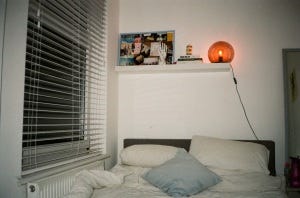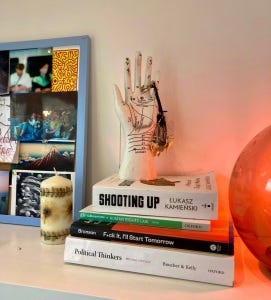Interview with Louisa
I sat down with Louisa, one of my closest friends, to talk about books. This was my first practice interview. When agreeing to do this, Louisa had emphasised that she didn’t read much, and didn’t feel like she would have enough to say. I explained that I wanted this project to be about reading, but also about not reading, and our feelings around that. It transpired that she had plenty to say about the subject, despite her anxieties.
We spoke about our changing relationships with reading, and how academia can alter the way we read. We also dipped our toes in nostalgia, taking a moment to reflect on seminal teenage texts by the likes of John Green and Alexa Chung.
We sat on her bed and both awkwardly tried to shift from our normal conversation to a formal one, which was precisely not the point of the exercise.
R: Ok, so do you read, or have there been points in your life where you’ve read, and how has this ebbed and flowed?
L: So from the beginning, I was a voracious reader as a child. Just complete escapism, zero social skills, completely introverted. I read back to back Jacquline Wilson books, and other really girly kind of books.
In my teenage years I started reading more murder mystery books. As I got older I didn’t read so much, but I always had a book in my little tote bag that I’d take to school. I’d read on the bus sometimes. And then as I’ve got older it’s just slowly turned into a thing that I do when I’m on holidays with my family, or maybe when I’m on public transport.
This chronology is pretty similar to my own experience, and one that prompted me to start exploring other people’s reading habits in the first place. I asked if any books had managed to grip her in recent years.
L: I tend to read things I’ve seen people reading on instagram, or things that have been in the press a lot, like Gone Girl and Normal People. Just because they were go-to choices that I thought would be easy to read.
R: Gone Girl is quite chunky, isn’t it?
L: Yeah, it’s really big. It’s a page turner as well. I read that on a ferry and it passed the time so quickly. I feel like I’ve read other books since but that’s one that I’ve remembered, maybe because it was famous, but also because it was so gripping.
L: There’s a point in the book where it just completely changes perspective and you see her as this horrible woman, rather than the protagonist that you’re really close to.
R: That’s the one with the ‘cool girl’ bit, right?
L: Yeah, the Cool Girl monologue. [Quoting]: “Eats cold pizza and stays a size zero”.
R: Do you have a favourite book?
L: My favourite book when I was a teenager was this book called Finding Violet Park. It’s about a guy who finds an urn and then he tries to find out more about this woman. It’s a proper teen novel, he falls in love with this girl. That was probably my favourite book growing up.
R: I feel like I remember that book! Teen fiction was the worst and the best. I’d love to go back to that.
L: Did you ever read John Green books? I used to annotate those to fuck.
R: Oh my God, yes. I had a copy of Looking for Alaska that was just completely highlighted.
L: Yes, me too! [Laughing]
R: And I look at it now and think I could never get rid of that even though it was such a shit book.
L: It was so corny!
R: [backtracking] But then it wasn’t a shit book, it was exactly what you wanted at that time. It probably didn’t pass the Bechdel test, thinking about it.
L: No. I think I actually wrote a quote out and stuck it on my wall.
R: Maybe there is something to be said for just finding what is written for people at your age and your situation, and indulging in it.
L: Rather than books about who you think you’re supposed to be, which I feel is always true of the books you pick up as an adult. Especially the non-fiction ones, you’re thinking “I should be the sort of person that reads this kind of book”.
R: Yeah, and feeling like reading it is going to change you. And then you’re probably reading trying to absorb. I feel like I often pick up books that are a challenge, but the ones we’ve just got excited about were such pure indulgence.
This idea of reading for a purpose, rather than for enjoyment, is one I’ve had to work hard to put to one side in my own reading. It’s a topic that we returned to frequently throughout our conversation.
R: Do you prefer fiction or non-fiction?
L: I used to read fiction, but now it’s pretty much all non-fiction. I think that in my free time I feel like I need to be learning something, whether that’s through books or podcasts.
So I tend to read non-fiction in my spare time, and listen to podcasts about finance [laughing]. It’s not actual escapism.
I never really end up finishing non-fiction books, besides Me and White Supremacy (Layla Saad, 2020), but that was really nicely structured so you would get to the end of it. But Akala’s book (Natives: Race and Class in the Ruins of Empire, 2018), for example, I bought two summers ago and never finished, because non-fiction books for me don’t have the same stick. By the time you’re half way through you’ve learnt so much, you don’t really need to get to the end to have gained from it. You’ve learnt something singularly without finishing it.
R: You said you feel like you need to be learning in your spare time. Do you feel guilt around reading in that sense?
L: Yeah, I definitely do. Reading used to be a defining thing for me.
At the end of year 6 they did awards and everyone got an award for what they’re most likely to be when they’re older, and mine was to write a best-selling novel [laughing].
So I definitely feel personal guilt on that level, that I don’t do this thing that I used to love so much, and there’s not really a good reason why.
I could say that I don’t have the time, but I do, because I sit in the kitchen for 3 hours every night speaking to my housemates, and I have enough time to sit on TikTok. But for some reason I don’t have enough time to read.
R: Do you have any books that you’ve carried with you from house to house?
L: Yeah, a few. Political Thinkers From Socrates to the Present (Eds Boucher & Kelly, 2003) is just like a bible of every political thinker going back to Socrates to Marx, so it’s just amazing. There’s a chapter on nearly every key person – well not every person, it’s incredibly western, let’s be honest.
And then Shooting Up: A Short History of Drugs in Warfare (Lukasz Kamienski, 2016) is this amazing backlog of information about the use of drugs in war, going back to the Vikings and the Inca Warriors.
For someone who claims not to read, her room is littered with daunting-looking volumes such as these, as well as law textbooks. The previous two texts that she mentioned related to her undergrad degree in Politics and International Relations. This shifted the conversation to academia and the impact that studying can have on the way we read.
L: I think that studying has taught me to read in a different way. Now, when I read a text book, I’m reading it and I’m trying to retain everything. When you’re reading fiction you don’t have to remember everything or read back sentences, you’re meant to just read it and feel it. Whereas now when I pick up a fiction book I’m constantly thinking about what to retain instead of just going where the author wants to take you. Because the author will point your attention to things that they want you to be attentive to, whereas the author of a textbook won’t necessarily.
R: That’s so interesting actually, I definitely experienced that at uni. I’d find it so hard to read because I’d get stuck on one point that I felt hadn’t gone in properly, and then keep going over that and forget that I’m supposed to just be following a flow.
R: Do you ever read autobiographies or memoirs?
L: No. Well actually, yes. The classic, Alexa Chung’s IT. I loved that and still pick it up from time to time, especially if I’m hungover. Half of it is bullshit, but it’s really easy to pick up. It’s about things like some ridiculously obscure lip balm that she picked up in Paris.
R: Yeah! Or that she keeps her Chanel nail varnish in the fridge [laughing].
L: One of my books here is an autobiography. Action Bronson, he’s a rapper and a celebrity chef. This is about his relationship with food throughout the years. The first two chapters I remember finding it so frustrating, it’s so self-indulgent. And he swears in it so much, and he’s just talking about himself. But once I got over that, and I was like – well, why else did I buy it? I want to hear him talk about himself. After I came to terms with that I really got into it and enjoyed it.
R: I guess you have to get used to the voice. I love autobiographies but I’ve only read a few physically, the rest of them I’ve listened to. I think that really cuts past the self-indulgent feeling, because it’s their voice and it’s like they’re telling you an anecdote. Lily Allen’s for example, because it was her reading it, with her own emphasis and expression, it sounded so natural and funny. But it might not have felt the same for me written down.
L: My Grandpa actually wrote an autobiography kind of thing. It’s really brief, just every ten years of his life, he wrote down what had happened to him and what he had learnt. He had a really interesting life
R: Maybe we should be doing that.
L: We should! We already have two decades to catch up on.



